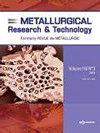Kinetic and mechanical properties of boronized AISI 1020 steel with Baybora-2 powder
IF 1.1
4区 材料科学
Q3 METALLURGY & METALLURGICAL ENGINEERING
引用次数: 0
Abstract
In this study, package boronizing process was applied to AISI 1020 steel by using Baybora-2 boronizing agent and the kinetics of boronizing process was investigated. The pack boronizing process was performed at 1223 and 1323 K temperatures for 2, 4 and 6 h. The properties of the boride layer formed on the surface as a result of the boronizing process were determined using optical microscopy and SEM analysis. XRD analysis was performed to determine the phases formed in the boride layer. As a result of the analysis, it was determined that the boride layer consisted of FeB and Fe 2 B phases. It was determined that the thickness of the boride layer increased with the increase of boronizing time and temperature. While the boride layer thickness for the temperature of 1223 K was between 115 and 196.3 μm, the boride layer thickness for the temperature of 1323 K was found to be between 157.2 and 304.7 μm. In this study, a boriding powder, patented and under development, was used and a surface layer with a hardness of 2224 HV was obtained on the surface of AISI 1020 steel. This hardness value is approximately 5 times the hardness values of steels hardened by traditional surface hardening methods such as cementation and nitriding. Also, considering the boride layer thicknesses, the activation energy was calculated as 162.26 kJ/mol using the classical kinetic method.Baybora-2粉末渗硼AISI 1020钢的动力学和力学性能
采用Baybora-2渗硼剂对AISI 1020钢进行了包渗硼工艺,并对渗硼动力学进行了研究。在1223和1323 K的温度下进行渗硼2、4和6 h。利用光学显微镜和扫描电镜分析了渗硼过程在表面形成的硼化物层的性质。采用XRD分析确定了硼化物层中形成的相。分析结果表明,硼化物层由FeB相和fe2b相组成。结果表明,渗硼层厚度随渗硼时间和渗硼温度的增加而增加。1223 K时硼化物层厚度在115 ~ 196.3 μm之间,1323 K时硼化物层厚度在157.2 ~ 304.7 μm之间。本研究采用已获得专利且正在开发的渗硼粉,在AISI 1020钢表面获得了硬度为2224hv的表层。这个硬度值大约是传统表面硬化方法(如胶结和氮化)硬化钢的硬度值的5倍。同时,考虑到硼化物层的厚度,采用经典动力学方法计算得到活化能为162.26 kJ/mol。
本文章由计算机程序翻译,如有差异,请以英文原文为准。
求助全文
约1分钟内获得全文
求助全文
来源期刊

Metallurgical Research & Technology
METALLURGY & METALLURGICAL ENGINEERING-
CiteScore
1.70
自引率
9.10%
发文量
65
审稿时长
4.4 months
期刊介绍:
Metallurgical Research and Technology (MRT) is a peer-reviewed bi-monthly journal publishing original high-quality research papers in areas ranging from process metallurgy to metal product properties and applications of ferrous and non-ferrous metals and alloys, including light-metals. It covers also the materials involved in the metal processing as ores, refractories and slags.
The journal is listed in the citation index Web of Science and has an Impact Factor.
It is highly concerned by the technological innovation as a support of the metallurgical industry at a time when it has to tackle severe challenges like energy, raw materials, sustainability, environment... Strengthening and enhancing the dialogue between science and industry is at the heart of the scope of MRT. This is why it welcomes manuscripts focusing on industrial practice, as well as basic metallurgical knowledge or review articles.
 求助内容:
求助内容: 应助结果提醒方式:
应助结果提醒方式:


